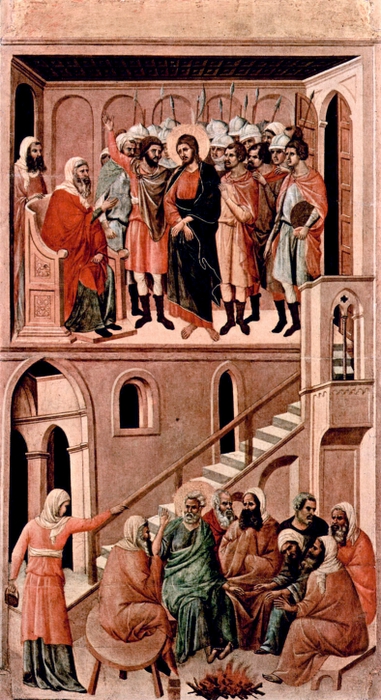The Way of Salvation - Sermon for Easter 4B (Acts 4)
 |
| Christ Before Annas (top); Peter Denying Jesus (bottom) |
When Peter and John went to the Temple to pray they encountered a man with a disability. That encounter led to a healing and a dance of joy on the part of the man who was healed, and finally to Peter’s sermon in Solomon’s Portico (Acts 3). Apparently, these activities in the Temple courts didn’t go over well with the Temple officials, who had Peter and John arrested.
This morning we turn the page to find Peter and John standing before the religious authorities. They want to know who authorized them to heal and preach in the Temple. That is, “by what power or by what name did you do this?”
I can empathize with the religious authorities because I’m the chair of the regional commission on ministry. This commission has the responsibility to authorize and hold accountable the people who serve as Disciples ministers. Obviously, the two Apostles didn’t get their credentials from the Temple authorities, but their question gave Peter another opportunity to preach.
According to Luke, Peter was “filled with the Holy Spirit” and began to tell the authorities that Jesus of Nazareth authorized their activities. They may have rejected Jesus’ ministry, but as the Psalmist declared “the stone that was rejected by you, the builders; it has become the cornerstone” (Acts. 4:11; Ps. 118:22).
Now Jesus didn’t have the proper credentials either, but he was authorized by God who raised him from the dead. Down the centuries others have heard the call and have been empowered the Holy Spirit to preach the good news in word and deed. When one door seems to shut, the Holy Spirit opens another door so the good news can be proclaimed to the world. As John Wesley famously declared, “the world is my parish!”
Peter closed his message by telling the authorities that “there is salvation in no one else, for there is no other name under heaven given among mortals by which we must be saved.” This is a controversial passage because it suggests that God is extending grace only to those who explicitly confess Jesus as savior. I know this perspective well because I once embraced it. While it can be read that way, I believe we can read it in a more inclusive manner.
I would suggest that neither Luke nor Peter were speaking about the fate of those who haven’t heard the Christian message. What Peter is trying to do is get the religious authorities to acknowledge that Jesus not only authorized their preaching and healing ministry but that Jesus had changed their lives and they want others to have the same experience. Peter and John couldn’t imagine another way of experiencing wholeness except through a relationship with God that comes through Jesus. Peter doesn’t offer us a detailed theology of salvation in this passage, but he is convinced that Jesus is the way of salvation.
So here is the question for us. Why does Jesus matter? To put it differently, what difference does Jesus make in your life? As we ponder these questions, let’s remember that the Greek words for salvation, healing, and wholeness are related. So how might we experience healing of body, soul, and spirit?
While I don’t have all the answers to our questions about the ultimate fate of everyone who has lived, is living, and will live, I understand why we ask the questions. We’re looking for assurances that we’re on the right track. The religious authorities thought they had the answers, and then Peter shook things up. Sometimes we need to have our assumptions challenged.
Over the years I’ve thought a lot about salvation and what happens to us after death. I’ve tried on a number of possibilities. Some of them have stayed with me and others I’ve let go of. More recently I’ve found a sense of assurance in the concept of theosis. This is a concept that has roots in Eastern forms of Christianity. The pathway of theosis involves ultimately experiencing union with God. This path starts with our experiences of God’s presence here on earth, so that as we draw closer to God “we may become participants in the divine nature” (2 Pet. 1:4).
The path of theosis begins in prayer and the fruit of this prayer, according to Vladimir Lossky, is “divine love, which is simply grace, appropriated in the depths of our being.” This love is “an uncreated gift— ‘a divine energy — which continually inflames the soul and unites it to God by the power of the Holy Spirit. Love is not of this world, for it is the name of God Himself” [Lossky, Mystical Theology of the Eastern Church, p. 212].
The end of this path that begins with God reaching out to us through Jesus is participating in the life of God. Or, as St. Athanasius said of Jesus: “He, indeed, assumed humanity that we might become God.” [On the Incarnation (p. 62). Kindle Edition]. Now, that doesn’t mean we get to reign supreme over the universe. We don’t get to sit on the heavenly throne, but the path of salvation in Christ, which is a lifelong journey, holds out the promise of being united with God in full communion. This is the message Jesus has given us to share with the world. This is the church’s one foundation as revealed to us in Jesus Christ our Lord, in whose name we are authorized to act in the world on the behalf of God who reaches out to us in Christ through the Holy Spirit so that the world might experience God’s healing grace.
Preached by:
Dr. Robert D. Cornwall, Pastor
Central Woodward Christian Church (Disciples of Christ)
Troy, Michigan
April 25, 2021
Easter 4B
Comments